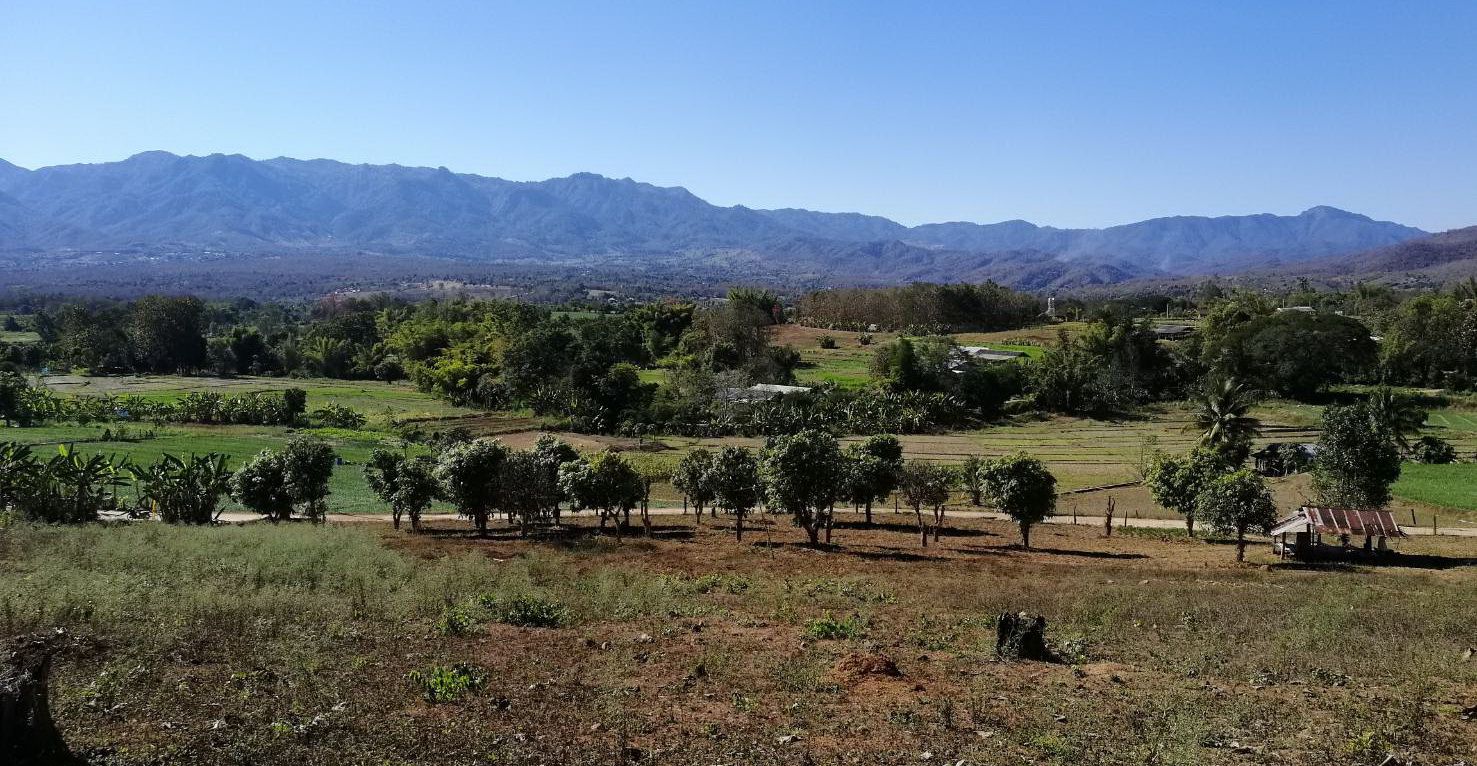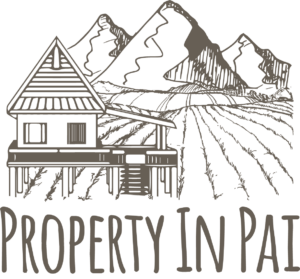Property and Land Information
Buying land or a house is often a stressful time, when it’s in another country it can be even more so. We’ve put together this short guide to help explain the basics and hopefully make things easier for you!

Can a foreigner own land in Thailand?
With the exception of Condos only Thai people have the right to own land in Thailand. Having said that there are a number of methods people use when looking to invest. The most common option is a 30-year lease which is registered at the land office.
Another option is setting up a Thai company and then the company can buy the land. There are pros and cons to both methods so it’s always advisable to consult a real estate lawyer to see what works best for you.
What is the maximum length for a lease in Thailand
Currently the maximum length for a registered lease in Thailand is 30 years. There are some people who will offer to include a 30-year extension in the contract but legally there is no way to enforce this. At the end of the initial 30 years both parties would have to agree to a new 30 year term.
What fess are involved with creating a lease
When you register a lease at the land office there is a 1.1% fee for the total value of the rental period. If for example you were renting for 5,000 baht per month and the lease was for 30 years that would be 1.8 million baht. The fee to register would then be 1.1% of that which is 19,800 baht.
If I have a lease can the land or house still be sold?
While the property owner retains the right to sell the land or house despite an existing lease, the new buyer is legally obligated to honor the terms of that lease. However, in practice, few buyers are inclined to purchase property encumbered by a lease agreement.
What are the best land titles?
There are a number of title deeds in Thailand but these are the main ones:
- Chanote (Nor Sor 4) – this is the highest title deed. It grants the owner full rights to the property. This land is accurately surveyed using GPS, with clear boundary markers, and can be freely bought, sold, rented, or mortgaged.
- Nor Sor 3 Gor – Like Chanote, the boundaries of the land have been measured and defined in relation to the neighboring land. The land parcel points have been set using an aerial survey. This land can be freely bought, sold, rented or mortgaged
- Nor Sor 3 Khor – This land has been surveyed but is issued in an are with no parcel points. Same as the above 2 titles there are no restrictions for the use of the land, apart from the zoning rules for the area.
- Nor Sor 3 – This document shows a persons right to possess a certain plot of land but the borders must be confirmed with the neighbors. There are no parcel points or official markers showing the boundaries. When selling this type of land, it must be publicly posted for 30 days before it can be sold.
There are a few other land titles, but only these offer true ownership rights, as opposed to usage or agricultural rights.
Can I buy a house even if I can’t own the land?
Yes, it’s possible to buy a house separate from the land the house is on. When doing this notice of the sale needs to be posted publicly for 30 days prior to the transfer.
You would still need to have a system in place for the land such as a 30-year lease.
At the end of the 30 years you would have to negotiate with the owner about what happens to the house.
What are the taxes and fees involved in buying property?
When purchasing land in Thailand, the following fees will apply at the land office:
- Transfer Fee – 2% of the appraised property value
- Stamp Duty – 0.5% of the registered value
- Withholding Tax:
- For companies: 1% of the higher amount between the registered sale value or the appraised value
- For private sellers: calculated progressively based on the appraised value of the property
- Business Tax – 3.3% of the higher amount between the registered sale value or the appraised value
Note: Business tax applies when a company sells the land or when an individual sells it within five years of purchase.
Responsibility for these fees should be negotiated between the buyer and seller as part of the overall purchase agreement.
Which party normally pays which fee?
There is no strict rule regarding who covers which costs; it is typically a matter of negotiation. To simplify matters, buyers and sellers often agree to split the fees evenly, with the exception of ‘Business Tax,’ which is almost always the seller’s responsibility.
However, if a more detailed breakdown is desired, the following division is commonly suggested:
- Specific Business Tax: Seller’s responsibility
- Stamp Duty: Seller’s responsibility
- Transfer Fees: Buyer’s responsibility
- Withholding Tax: Seller’s responsibility
The seller wants to declare a lower price than what I’m actually paying?
The government-assessed value of a property, known as the appraised value, is often significantly lower than the actual sale price or market value. These appraised valuations are determined by the Treasury Department and the Land Department and are updated every four years. In practice, when selling a property in Thailand, sellers typically prefer to declare a price close to the appraised value to reduce their personal income and transfer taxes. While undervaluing the sale price is a known practice in Thailand, it is illegal. By law, parties must declare the true sale price when registering the transaction at the Land Department.
If the purchaser is a company, for accounting purposes, the company’s financial records should reflect the actual purchase price as stated in the sale and purchase contract, separate from the land office sale agreement. These records will eventually be audited, and the company’s tax return will be based on them. Declaring a lower price poses the risk that the discrepancy will be discovered later when the Revenue Department compares the official land office documents with the company’s financial accounts. In such cases, the situation would need to be corrected, and a significant fine could be imposed
Do I need a laywer to buy land?
If you’ve lived here for a while and have a Thai wife or partner, you may feel that a lawyer is unnecessary, as the land transfer process at the land office is relatively straightforward. However, complications can arise, and having a lawyer to draft contracts and conduct due diligence on the land can save you significant trouble down the line. If you’re considering purchasing land through a Thai company, engaging a competent lawyer is strongly advised.
Can you help me find a good lawyer?
Ultimately, the choice of lawyer is a personal decision. Over the years, many of our customers have worked with different lawyers, and we’re happy to share their contact information with you. This allows you to reach out to a few and find one that suits both your preferences and budget
What are the planning rules in Pai?
Pai is made up of several villages, each with its own planning office, and the area is divided into various zones, making this a complex question to answer. In general, land outside town and village centers is zoned for ‘Rural and Agricultural’ use, which imposes restrictions on the percentage of land that can be developed for residential or commercial purposes, as well as limits on building size and height.
Once you’ve found a piece of land you’re interested in, your lawyer can conduct these checks as part of their due diligence process.
Do i have to pay you anything to help me find a property?
No, in Thailand, agents work on a commission based on a percentage of the final sale price, which is paid by the seller. As a buyer, you are not responsible for any payment to the agent.

Owner and
Sales Manager
Land Measurement
Thailand doesn’t use the metric or imperial measurement systems we’re used to, instead they use their own system which is expressed as Rai, Ngan and Square Wah (or Talang Wah).
- 1 sq. wah = 4 sq. m. 1 acre = 2.471 rai or 43,560 sq. ft.
- 1 ngan = 100 wah (or 400 sq. m.) 1 hectare = 6.25 rai or 10,000 sq. m.
- 1 Rai = 4 Ngan (or 1600 sq. m.)
When talking or writing about land size its normally expressed in the way Rai – Ngan – Sqw
We’ve created a table to make conversions easy
| Sqaure Wah | Square Meter | Ngan | Rai | Acre | Hectare |
|---|---|---|---|---|---|
| 1 | 4 | ||||
| 100 | 400 | 1 | 0.25 | 0.1 | 0.04 |
| 400 | 1600 | 4 | 1 | 0.4 | 0.16 |
| 800 | 3200 | 8 | 2 | 0.8 | 0.32 |
| 1200 | 4800 | 12 | 3 | 1.2 | 0.48 |
| 1600 | 6400 | 16 | 4 | 1.6 | 0.64 |
| 2000 | 8000 | 20 | 5 | 2 | 0.8 |
| 2400 | 9600 | 24 | 6 | 2.4 | 0.96 |
| 2800 | 11200 | 28 | 7 | 2.8 | 1.12 |
| 3200 | 12800 | 32 | 8 | 3.2 | 1.28 |
| 3600 | 14400 | 36 | 9 | 3.6 | 1.44 |
| 4000 | 16000 | 40 | 10 | 4 | 1.6 |
How to buy land in Thailand
As a foreigner, the honest answer is you can’t really own land. There are methods that people use on a regular basis which we will outline below.
If you wish to learn more about the different options available we can recommend MJ & Co based in Chiang Mai. They can walk you through the different options available and help you navigate the government system to give you the best protection possible. You can contact them through their facebook page below and for those already in Pai they come to Pai once a month and are happy to provide a consulation for a very reasonable price.
https://www.facebook.com/mjandco.th/
Being Married to a Thai
Foreigners married to a Thai can buy land but they do not have any rights over the land and it has to be in their Thai partners name. As a foreign spouse, your name and passport will be recorded during the sale at the land office but this doesn’t give you any rights to the land and you may have to sign a declaration stating that the funds used belong to the Thai partner.
Leasehold agreement
This is another popular option. Once the land has been purchased, either in a Thai friend or partners name, you can register a 30-year lease for the land. The wording of the lease is very important so it’s always worth contacting a professional lawyer to help with this. A lease can give you full rights over the land including the option to sell the lease.
Renewals are not generally automatic but clever drafting can increase your chances. The lease needs to be registered at the land office and is then attached to the property deed. The cost is 1.1% of the total rental value.
Thai Company
The final option is to set up a Thai registered company. You still can’t own the land but your Thai company can. Thai law states that you can only own 49% of the company and the remaining 51% has to be Thai owned. This will require a lawyer to help you set up and there are many factors to be taken into consideration. It’s not as simple as it is sometimes made out to be.
